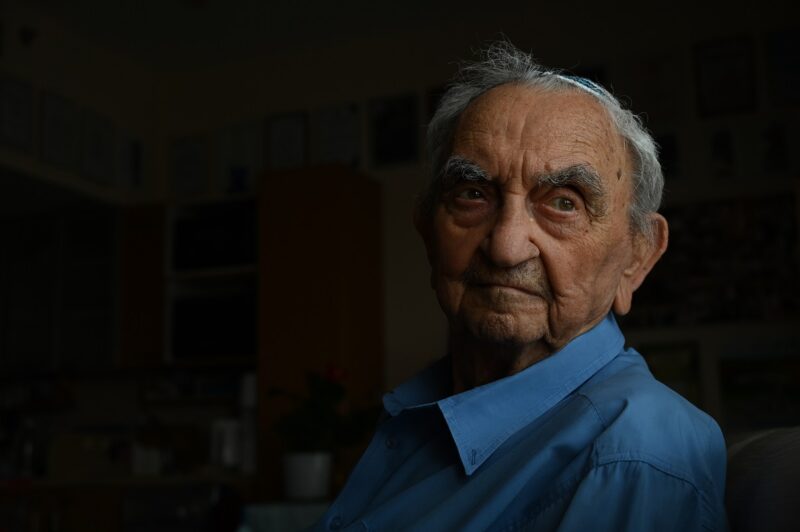
Avigdor Neumann
Holocaust survivor, Auschwitz-Birkenau
Until 1939, our life in Czechoslovakia was happy and peaceful, almost carefree. Everything changed suddenly with the Hungarian invasion, which brought increasing discrimination against Jews. The Hungarians adopted Nazi anti-Semitic laws, leading to severe restrictions: Jews were forbidden from opening private businesses, barred from entering universities, and overall, the atmosphere on the streets became threatening. Fear became a part of everyday life.
When the Germans invaded and occupied our region in March 1944, everything changed. We were forced to wear the notorious yellow badge – a humiliating symbol that we had to display openly on our clothing. More than anything, I remember the sense of dread and anxiety that filled our home and the constant fear I saw in my parents’ eyes. Amid all the chaos, I withdrew into myself. I tried as hard as I could not to be a burden, not to disturb, not to add any more weight to my parents’ already heavy load. With a child’s intuition, I understood that what was happening around us was far more serious than words could express.
Toward the end of April, Hungarian forces arrived and forced us out of our home into the ghetto they had established in the city. We were made to leave our entire world behind us. After several weeks of living in overcrowded, uncertain conditions, we were loaded onto an unbearably packed cattle car. No one told us where we were going.
At one of the stops along the way, my father noticed that we were heading east – likely toward Poland. He was deeply worried and told us it was a bad sign. It was known that in Eastern Europe, Jews were being shot, but we had never heard of a place called Auschwitz-Birkenau.
After three long and exhausting days of travel – crammed into a cattle car in unbearable conditions, without water, food, or toilets – we arrived at Birkenau. The moment the doors opened, we were hit by a brutal reality: loud shouting in German, barking dogs, an overwhelming sense of fear in the air, and a cruel selection process on the platform that determined who would be sent to the gas chambers and who would be spared to live another day.
In those first moments after we arrived, I didn’t truly understand that we had entered a death camp. I followed my mother, trying to help her with my younger siblings. Suddenly, I felt someone grab my arm and pull me away from the line of women and children. All I wanted was to stay close to my mother, so I managed to break free and ran back to that line.
The man who had pulled me was a prisoner in the camp. He knew we were about to face a selection led by Dr. Mengele, and he was trying to save me. He came back to me – this time more forcefully – and warned, “If you stay here, it will be the end of you.” Looking back, I know that in that moment, he saved my life. He couldn’t tell me what was about to happen to my family, but he did manage to pull me away from the line of death.
That’s how I found myself standing on the men’s side. When I reached Mengele, he asked, “How old are you?” Without hesitation, I replied, “Fifteen,” though I was only twelve and a half. When he asked what my profession was, or what skill I had, I answered, “Mechanics,” though I had never done such work in my life. Those answers helped me survive the selection – and live another day in Auschwitz.
After the selection, my brother, my father, and I were taken to Block 11 in Camp A. The next morning, when we were awakened to line up for roll call, I remember seeing four chimneys billowing thick smoke and smelling the scent of burning flesh. I couldn’t comprehend what my eyes were witnessing. A prisoner standing beside me simply explained, “Do you see the smoke? That’s your family burning in the flames. Welcome to Auschwitz.”
Two days later, they separated me from my father and brother, and I never saw them again. That’s how I found myself- a twelve-and-a-half-year-old boy – alone in Auschwitz. I didn’t have much time to think about what I had been through or what had happened to my family. I was in a pure survival mode. Luckily, I got a relatively “good” job – I collected the camp’s garbage. This job gave me access to the kitchen, allowing me to eat potato peels – a source of nutrition that many prisoners didn’t have at all. Under inhuman conditions, I somehow managed to survive in Auschwitz for eight months.
As the Russians began advancing toward Auschwitz, the Germans decided to evacuate all the prisoners and force them on death marches westward to concentration and labor camps in Germany. On January 18, 1945, in temperatures of minus 25 degrees Celsius, I set out on this death march. The march lasted three days and nights. Thousands who couldn’t keep up were shot dead, and others simply froze to death in the bitter cold nights. We marched from Auschwitz to Altammer, where we were then loaded onto freight trains bound for Austria, to the Mauthausen concentration camp. The sights at Mauthausen were unbearable. Food was almost nonexistent, and it was the first time in my life that I witnessed cannibalism – an appalling image that has never left my memory since.
From Mauthausen, we were forced on another death march to Gusenkirchen, and fortunately, there the American army managed to liberate us. It was May 4, 1945. At liberation, I was a 14-year-old boy, lost and confused. I didn’t know where to go or what to do. I knew my parents were no longer alive and that my family had been murdered.
With time to reflect, painful memories began to surface, plunging me into a deep depression. Those memories have stayed with me throughout my life, and coping with them has never been easy. Though I left Auschwitz behind, Auschwitz never really left me.
After the liberation, I returned to my hometown, and to my surprise, I found my older sister, Sima Rachel. It was a deeply emotional reunion – like a resurrection from the dead. We were the only survivors from our entire family. My sister quickly realized that we had no future left in Europe, and she made the decision that we would immigrate to the Land of Israel. There, in the Jewish state, we began our new lives.
Despite everything I endured, the Neumann family only grew bigger. I have two children, seven grandchildren, more than forty-three great-grandchildren, five great-great-grandchildren, and one great-great-great-grandchild – they are all my greatest pride. For many years, I didn’t speak about what happened to me in Auschwitz, but during a visit to Europe and to Auschwitz itself, something changed in me, and I began to speak out. Wherever I can contribute to preserving the memory of the Holocaust, I will be there. This is my mission in life. I believe that God has kept me alive for so long so that I can tell, share, and pass Holocaust remembrance on to future generations. To me, this is a sacred mission.
After the Holocaust, I made a decision to rise from the ashes and live a full and meaningful life. I always tell people: learn from me. From every disaster and every crisis, one can choose to grow. I did not choose to go through the Holocaust, but I certainly chose how to live my life afterward.”
